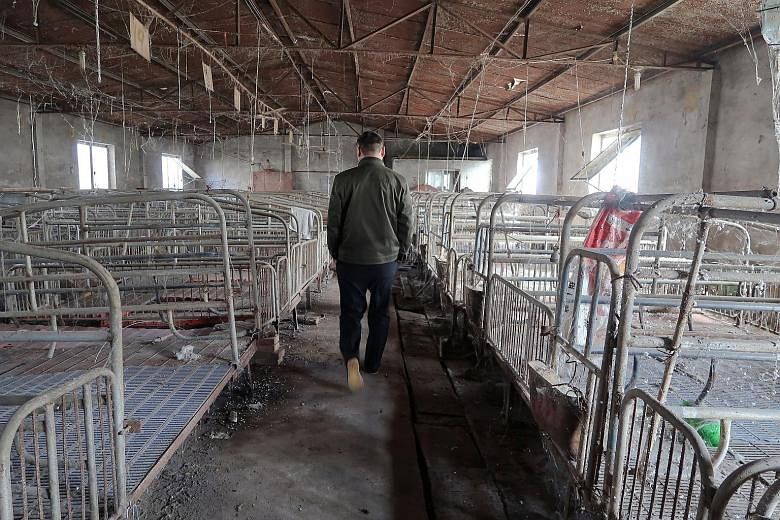ZHOUCUN (China) • When Mr Zhang Faqing received a letter from the government last December ordering him to close his pig farm on the outskirts of Beijing with just two weeks of notice, he thought it was a joke.
However, after local officials visited his farm in Zhoucun village a few days later, the 47-year old realised it was no laughing matter.
Almost one year later, he is still waiting for millions of yuan in compensation promised by the government, more than a dozen pig pens that used to house his 15,000 hogs stand empty and he is still at a loss about what to do.
"I had to sell (my pigs) at whatever price the buyers offered, so I basically sold the meat at the price of cabbage. I lost so much money," he said on a recent visit to his farm. He lost more than 70 million yuan (S$14.4 million), he said.
Mr Zhang is among hundreds of thousands of small pig and poultry farmers across the country who have been forced to close as Beijing wages a three-year campaign to clean up the world's biggest livestock sector.
Tough new pollution standards will ban livestock production near water sources or heavily populated areas. Farms in other regions must meet higher standards for treating manure. The Ministry of Agriculture declined to comment for this article.
Mr Zhang had little choice but to shut up shop and sell his pigs because his farm was too close to a reservoir.
After years of complaints about foul smells and filthy water from unregulated farms, many rural villages are now celebrating their pig-free status.
In the long term, however, the policy will reshape the nation's scattered livestock industry with a whopping 1.1 billion pigs, squeezing out smallholders and boosting the share of industrial-scale farms as the government aims to develop more modern and efficient agriculture. Backyard family-run operations each with fewer than 50 pigs account for 90 per cent of China's hog farms, but only a third of supply.
With this push, big players like Guandong Wens Foodstuff Group and New Hope Liuhe, which are building mega-farms, stand to grab a larger share of the pork market worth about 7 billion yuan.
Analyst Yao Guilin, with China-America Commodity Data Analytics, reckons the environmental inspections will have a significant long-term impact on meat supplies and prices.
"Pig farming in China will gradually develop into a semi-monopolistic structure, with major companies dominating the market and competing with each other," said researcher Zhu Zengyong from the Agricultural Information Institute of the Chinese Academy of Agricultural Sciences.
REUTERS

